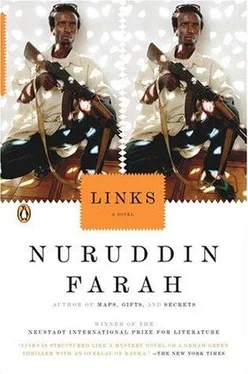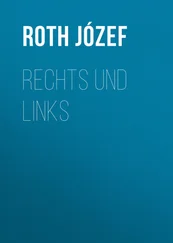The noise of the teahouse ascended in cigarette smoke toward the low ceiling and then descended as an indecipherable din. The ceiling fans turned and turned, but didn’t produce cool air. Straining his neck, his eyes focused on the window farthest from him, Jeebleh saw a jalopy resembling Af-Laawe’s.
“Before Bile came, Shanta and I had lived in mutual dependence, to the exclusion of everyone else,” Faahiye said. “We both held the view that hell is a blood relation. Myself, I can take my blood relations only in small doses, never in concentrated form. We got together a year after her mother’s death, some time before yours passed away. She was a wonderful woman, your mother, God bless her soul, and I was very fond of her.”
Jeebleh was more moved to hear this than he might have expected.
“Your mother was the first to hear of our wish to marry, because Shanta treated her like a second mother. Sadly, we had very little time for anyone else, and we seldom visited her. But whenever we did, she was warm and caring. Her housekeeper was a brave woman, able to tell Caloosha off when he got out of line. She loved you, your mother, and had nothing but praise for what you stood for.”
Tears coming to his eyes, Jeebleh asked whether Faahiye had any idea how he could reach the housekeeper.
“I know where she is,” Faahiye said.
“Where?”
“She and I lived in adjacent rooms in the refugee camp in Mombasa. She was penniless, depressed, and lacking in energy. She came to life only when she was angry and cursed Caloosha, or was full of joy and praised your mother’s generosity of spirit — or yours!”
“When did you get back from Mombasa?”
“This morning.”
“Tell me more. Please.”
“I am not at liberty to do so,” Faahiye said.
“And why not?”
“This is too complicated to get into now.”
There was a long silence.
“Anyhow,” Faahiye said finally, “Bile came when Shanta had lain on her back for almost two days, in labor. We were cursing our misfortunes, to be bringing a baby into a world falling around our ears. The Dictator had fled, and many members of my own clan family had been rounded up and killed en masse. So bad was the rabble-rousing rhetoric that Shanta, between groans, kept suggesting that I leave, that maybe it wasn’t safe for me.
“Bile came. I’ve got to hand it to him, he knew what to do. He turned the baby to a position that would make for a healthy delivery. He delivered Shanta of a baby in a shorter time than it took him to decide whether to put aside the moral and psychological constraints of his medical ethics. Then he touched Raasta.”
“ Touched Raasta?”
“He appropriated her soon after delivering her. I understand now that he touched her out of human tenderness, which he must have missed, given that he had spent many years in solitary confinement. Later, I noticed that she quieted down whenever he picked her up, whereas she was in great distress when I held her. Raasta was jinxed, I thought. Why, she’d make as if suckling at his breast. I went ballistic, and on the attack. I spoke of murder, and of robbery. I had the proof. Bile had arrived with a duffel bag full of money. Where had he gotten it? No one leaves prison with a duffel bag full of money. He gave me some incredible spiel about stumbing on the funds, but I wasn’t satisfied, and demanded proof of his innocence, which he couldn’t provide.”
“Why did you leave without any explanation?”
Faahiye replied, “I was irreconcilably hurt by Shanta’s flippant remarks, spoken first in jest and in private, then in anger, in total seriousness, and in public. I had felt since Bile’s arrival that she was a changed woman. Occasionally, she behaved as though her brother’s presence turned her on sexually. And when I called him a murderer and we exchanged rude words, she took his side, saying how she hated having to deal with two children, one of whom was a grown adult — meaning me — and the second — meaning Raasta — a baby at her breast. I was reduced to an outsider in my own home, made into an ogre in front of my friends, and treated like an embarrassment in the presence of acquaintances. I withdrew in shame. I was of use only when they needed a fourth at the card table. Then they would ask me to join them.”
“Did you at any point suspect that Bile had it in for you, because the two of you belonged to different clans?” Jeebleh asked.
“That never crossed my mind.”
“Did you talk to Bile?”
“According to him, there was no basis for what he referred to as my self-exclusion. And the fact that he turned things around and made me feel that I was excluding myself didn’t help matters at all. I quoted to him a proverb: ‘A cow got while on a looting spree doesn’t produce a calf that’s legally yours.’ And I forbade my daughter to be fed on the powdered milk that he had bought. The battle lines were drawn. We were engaged in a war of wills over what was right and what was wrong!”
Jeebleh had heard enough about Raasta, and so he asked: “Where’s Raasta?”
“I haven’t any idea.”
Faahiye struck Jeebleh as straightforward.
“How about Makka?”
“No idea either.”
“When did you last see them?”
“I saw them before I left for Mombasa.”
“At Bile’s or at Shanta’s?”
“At one or the other’s. I can’t be certain.”
“Where are you staying now?”
“I am not at liberty to disclose this detail.”
“With Caloosha? With Af-Laawe?”
“I am not at liberty to disclose this,” Faahiye repeated.
There was another long silence.
Jeebleh wondered if the cartel — and there was clearly a cartel, he told himself, organ-stealers or not — had flown Faahiye in from Mombasa, promising that he would see his daughter and Makka on the condition that he kept certain secrets to himself. He asked, “Will you call me if they will let me meet with Raasta and Makka after you’re allowed to see the two girls yourself?”
Faahiye’s eyes became evasive. He looked around, as if searching for someone tailing him or eavesdropping on his conversation. And then, with a knowing smile covering much of his face, maybe out of relief that Jeebleh had worked out the mystery for himself, he replied quietly but urgently, “I’ll see what I can do!”
Then, without much ado, both got up to leave.
ONCE OUTSIDE THE TEAHOUSE, JEEBLEH USED THE MOBILE TO PHONE DAJAAL and ask that he pick him up. Dajaal questioned him about where he was, and set a spot to meet him.
Before the two men bid each other farewell, Faahiye told Jeebleh a folktale.
“It happened a long, long, long time ago,” he said. “A son, reaching the age of twenty-something, marries. Blessed with children and a loving wife, the son takes his blind, now senile father to a tree very far from the family dwelling, gives the old man some water in a gourd and some milk in a pitcher, and leaves the helpless old man there. He promises he’ll return for him shortly, only he knows he has no intention of doing so. The old man dies from exposure to the elements. But before dying, the old man curses his son.
“The years come and go, and the son grows to become an old man, his sight weak, his hearing gone, almost an invalid, a burden to his family. One day, his own son takes him for a walk, away from the hamlet to a desolate place. He puts two gourds, heavy with milk and water, close to him, and vows that he’ll return for him before nightfall.
“The old man remembers what he, as a young, strong man, had done to his ailing, blind father. So he calls back his son and says, ‘My father cursed me for doing to him what you’re doing to me now, because I left him, a senile old man, to die alone. I lied to him, he cursed me, and so from then on, misfortunes called on me frequently. I’ll pray for my father’s pardon, and I’ll pray that God blesses your every wish with His approval. May good fortune smile on you and your family, my son!’
Читать дальше












